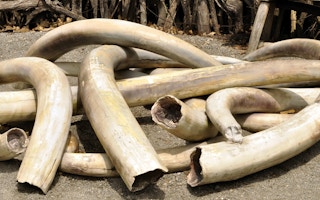On Monday, June 13, Singapore crushed — for the first time — nearly 8 metric tons of confiscated elephant ivory worth about 13 million Singapore dollars (~$10 million).
The ivory crush is intended to send a “strong signal of Singapore’s zero tolerance on the use of Singapore as a conduit to smuggle endangered species and their parts,” Singapore’s Agri-Food and Veterinary Authority (AVA) said in a statement.
AVA officials used an industrial rock crusher to crush and pulverise the ivory, and then incinerated it at an eco-waste incineration plant. The ashes will be taken to a landfill at the island of Pulau Semakau, AVA said.
“The public destruction of ivory sends a strong message that Singapore condemns illegal wildlife trade” Desmond Lee, Singapore’s Senior Minister of State for National Development and Home Affairs, said in a statement. “By crushing the ivory, we ensure that it does not re-enter the ivory market. Tackling this illicit trade requires close international cooperation, and also the assistance of the public and NGOs. We will continue our enforcement efforts, to prevent Singapore from being used as a transit point.”
Ivory is not in big demand in Singapore, according to a study by TRAFFIC and WWF Singapore. But the country is an important transit hub for ivory shipments moving from Africa to China and Vietnam.
“
The public destruction of ivory sends a strong message that Singapore condemns illegal wildlife trade.
Desmond Lee, senior minister of state, National Development and Home Affairs
Between 2013 and 2015, officials in Singapore have seized five ivory shipments amounting to over seven metric tonnes of illegal ivory, according to TRAFFIC. Additionally, 16 other confiscated shipments — amounting to about four metric tonnes — may have either passed through Singapore or were being shipped to Singapore, TRAFFIC reported.
TRAFFIC and WWF-Singapore agreed that Monday’s ivory crush was symbolic of Singapore’s intolerance towards illegal ivory. But they added that this gesture needs to be “followed up with meaningful action to address the country’s unenviable role as a transit point in the smuggling of ivory from Africa to Asia.”
“We know little about how consumers and traders are responding to these very public symbolic acts, or how it may be impacting the poaching of elephants”, Chris R. Shepherd, Regional Director for TRAFFIC in Southeast Asia, said in a statement. “Acquiring such knowledge is a vital part of overall efforts to tackle the elephant slaughter and illegal ivory trade.’’
TRAFFIC and WWF added that an independent audit of the stocks being destroyed before the event is necessary to ensure transparency in the process. An audit would also help prevent it being used as a cover for laundering remaining stock into illegal trade.
In April this year, Kenya burned more than 105 metric tonnes of ivory. South Sudan, too, burned over 5 metric tonnes of seized ivory and rhino horn on Sunday, according to media reports.
This story was published with permission from Mongabay.com










